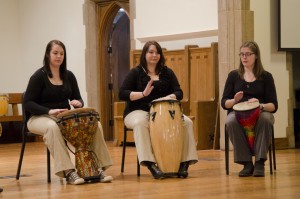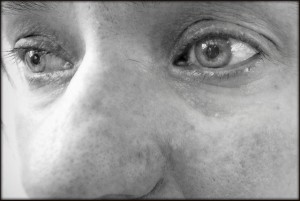
Depression in older people is associated with substantial disability, increased suicide rates, lower quality of life, and higher health care costs; much like depression in younger people. It’s bad.
Unfortunately, depression in older adults is often inadequately treated as a result of complications due to other issues associated with ageing. For example, antidepressants and psychotherapy have shown some efficacy in treating depression in older adults, but antidepressants may have unwanted side effects in combination with other medications that older people are more likely to be taking, and both antidepressants and psychotherapy tend to have poor treatment adherence. It should be noted that this is often not due to the person receiving the therapy, but rather services failing to meet their often more complex needs. For example, medications may not be easy to access if you have arthritic hands and psychotherapy may not be easy to travel to regularly, even if you have a fast car.
As a result of its low cost, tolerability and relatively good rates of compliance, there has been an increasing interest in music therapy as an alternative treatment for people with various mental illnesses. You’ll note that effectiveness isn’t mentioned in that list. Music therapy is defined as the:
professional use of music and its elements as an intervention in medical, educational, and everyday environments with individuals, groups, families, or communities seeking to optimise quality of life and improve physical, social, communicative, emotional, intellectual, and spiritual health.
This definition is from the World Federation of Music Therapy so it’s no surprise it has a list of claims it would take you all night long to read. Basically, music therapy involves people who are trained in it, using music to try to make people feel better.
Generally, if I asked you to play word association with the word, ‘elderly’, music may not be the first connection you’d make. After all, people over the age of 60 years can’t make music. You imagine they’d take to it like an entomologist who had been made to kneel on a diamond while a stone rolled over their remaining beetle. Bob Dylan. Nevertheless, along with the increasing interest in music therapy for other mental health problems there has been increasing interest in music therapy for mental health problems in older adults. Especially in cases where the drugs don’t work. But does music therapy work? To find out, a systematic review was conducted. Everybody’s talkin’ about it.

There has been an increasing interest in music therapy as an alternative treatment for people with various mental illnesses.
Method
Studies were identified that evaluated the efficacy of music therapy for older adults with depression by searching PubMed, the Cochrane Central Register of Controlled Trials, EMBASE, PsycINFO and the other electronic databases that are used time after time.
To be included in the analysis, studies had to be randomised controlled trials as defined in the Cochrane Handbook, i.e. trials in which participants were allocated to conditions using true randomisation.
The systematic review included studies involving people aged 60 or older with clinical diagnosis of depression, identified using any diagnostic criteria (ICD-10/DSM-5) or depressive mood coupled with another disease, such as hypertension or Alzheimer’s disease. Studies that used healthy people to detect the efficacy of music therapy in reducing depressive symptoms were also included.
Studies looking at any type of music therapy were eligible for inclusion in the analysis. These could be comparing
- Music therapy plus standard therapies versus standard therapies
- Music therapy versus no treatment or standard care or an active control condition
The main outcome the review was interested in was whether music therapy resulted in a change in depressive symptoms (measured using a self-rated or independently scored scale).
Results
Nineteen articles met the criteria for inclusion in the review. Ten of the studies used music therapy plus standard therapies to make comparisons with a control group.
In terms of participants:
- Six studies involved people with diagnoses of depression
- Five studies involved people with diagnoses of varying degrees of dementia
- Six studies involved people with some other health condition e.g. osteoporosis, coronary artery disease
- Two studies involved healthy volunteers
While nine studies used adequate random allocation sequences for participants, the randomisation methods of the other studies included were unclear and merely indicated that participants were randomly allocated to a study group. We’ll come back to this, but for now we’ll let it be.
There was no significant difference for reduction in depression with music therapy plus standard care and standard drug treatment compared with standard care and standard drug treatment. (Combined standardised mean difference = 0.90 (95% Confidence Interval = 0.70 to 1.09). There was no evidence of heterogeneity among these studies i.e. they were largely similar to each other.
There was no significant difference for reduction in depression with music therapy plus standard drug treatment versus standard drug treatment. (Combined standardised mean difference = 0.98 (95% Confidence Interval = 0.61 to 1.34). There was evidence of moderate heterogeneity among these studies i.e. they were a bit different to each other.
There WAS a significant difference for reduction in depression with music therapy plus standard care versus standard care. (Combined standardised mean difference = 1.20; 95% Confidence Interval = 0.66 to 1.75). There was evidence of heterogeneity among these studies i.e. they were different to each other.
There was no significant difference for reduction in depression with music therapy versus standard therapies. (Combined standardised mean difference = 0.60; 95% Confidence Interval = -0.08 to 1.28). There was evidence of high heterogeneity among these studies i.e. they were very different to each other.
Overall the results showed that music therapy had a significant effect in reducing depressive symptoms (Standardised mean difference =0.95; 95% Confidence Interval = 0.78 to 1.12) among older adults with depression, but not older adults with dementia (Standardised mean difference = 0.39; 95% Confidence Interval = -0.03, 0.82).
Analysis revealed that publication biases likely affected the results of the meta-analysis (only studies that show a significant effect of music therapy for symptoms of depression are likely to be published, while those that show no effect are likely to languish in the not-published bin for the longest time).

There was a significant difference for reduction in depression with music therapy plus standard care versus standard care.
Authors’ conclusions
The authors state that when music therapy was added to standard therapies (standard drug treatment and/or standard care), ten of the 19 studies included show that it had a significant effect in reducing symptoms of depression in older adults.
They also claim that their meta-analysis suggests that music therapy has significant effects in reducing depression in older adults when added to standard therapy, but not on its own compared with standard therapy.
Through subgroup analysis of the relationship between depression and disease, the authors argue that music therapy had a positive effect in decreasing depressive symptoms among older adults with depression, but not in older adults with dementia. The authors conclude that as music therapy is relatively inexpensive with no noted harmful side effects, it warrants further study to fully investigate all potential benefits.

Music therapy had a positive effect in decreasing depressive symptoms among older adults with depression, but not in older adults with dementia.
Discussion
Despite the observation that ten of the 19 studies included showed that music therapy was effective, we know that these results are likely affected by publication bias. This is true to some extent for all research, but in combination with the relatively small number of studies included in the review, it means that we have to interpret these results with caution, no matter how much faith you have in music therapy.
The population being studied doesn’t appear to have been made very clear in this research. We know that the effectiveness of music therapy for older adults is being investigated, but we don’t know exactly what the therapy is for. The primary outcome was reduction in depressive symptoms, but was this for people who were depressed due to chronic illness, people with major depressive disorder or the older adult population in general? These are potentially very different groups with very different needs who may react to therapy differently.
To be clear on its efficacy, music therapy must be studied in more specific groups. Ultimately, this would also help with deciding who should be ‘prescribed’ it. Music therapy might make people feel better in the short term, it might be low cost, but to be considered a true therapy it has to work, and while two out of three ain’t bad, the last one is important.
A key result from this analysis was that while music therapy had no significant impact on depressive symptoms compared to standard therapy, it seemed that music therapy did have a significant effect when added to standard therapy (compared with standard therapy alone). This is fine, as this is likely to be the setting in which music therapy would be used for someone with depression. However, included with this finding was the observation that these studies were heterogenous. To be more confident in these results we would need more studies that used standardised methods to find that music therapy has an adequate effect. Wouldn’t it be nice?
The authors noted that for many of the studies the method of randomisation wasn’t clear. It could be argued that if this was the case, those studies shouldn’t have been included in the analysis. The inclusion criteria specified true randomisation was needed, but the authors still included studies where it wasn’t known if this was the case. This also obscures the usefulness of the results and must be corrected if the researchers want to be dancin’ on the ceiling.
Finally, one argument made in favour of music therapy was that it has no side effects. However, very loud music or particular types of music may make some people feel uncomfortable or irritated. In addition, as with talking therapies, music therapy may trigger strong reactions or evoke memories which might be very unpleasant. One could argue that this is more likely in older adult with depression. While a music therapist should be trained to support people if this occurs, to say that music therapy has no side effects is potentially misleading. This issue was not explored in this systematic review. In conjunction with any future study into the efficacy of music therapy, more research into any potential side effects must be included. That would be good.

Music therapy may trigger strong reactions or evoke memories which might be very unpleasant.
Summary
- In this systematic review of the efficacy of music therapy in older adults with depressive symptoms, it was concluded that music therapy plus standard therapy was effective in reducing symptoms of depression compared with standard therapy alone (except if the older adults had dementia).
- However, it is apparent that the small number and heterogeneity of studies included accompanied with an unclear study population and some other methodological problems mean that the results must be interpreted with considerable caution.
If you were to have to summarise such a study, you might have to amuse yourself by trying to get the names of songs into the text, although you’d have trouble getting away with it. Unless you were a smooth criminal.

How many song titles can you spot in Dave’s blog. Answers in a tweet!
Links
Primary paper
Zhao K, Bai ZG, Bo A, Chi I. A systematic review and meta-analysis of music therapy for the older adults with depression. Int J Geriatr Psychiatry 2016;doi: 10.1002/gps.4494. [PubMed]
Other references
Barlow D.H. Negative effects from psychological treatments. American Psychologist 2010;65:13-19. [PubMed]
Bradt J, Dileo C, Grocke D, Magill L. Music interventions for improving psychological and physical outcomes in cancer patients. Cochrane Database Syst Rev. 2011;(8):CD006911. [PubMed]
Ylli A, Miszkurka M, Phillips S.P, Guralnik J, Deshpande N, Zunzunegui M.V. Clinically relevant depression in old age: An international study with populations from Canada, Latin America and Eastern Europe. Psychiatry Res 2016;29;241:236-241. [PubMed]

@Mental_Elf great summary @hullodave with cheeky last line, you could be starting something ! already thinking of song titles & lyrics…
@ian_hamilton_ @Mental_Elf I predict a riot.
Music therapy for depression in older adults: How can I be sure of you? https://t.co/cGdEOmVpCc Me for @Mental_Elf.
@hullodave @Mental_Elf I found similar trends when I did my dissertation in dementia care, combining music with other therapies is useful ??
@hullodave @Mental_Elf
The answer my friend is blowing in the wind!
Today @hullodave in the mix: Music therapy for depressive symptoms in older adults https://t.co/XRiDx5bM28
@Mental_Elf @hullodave
12? Probably more!
Looking at the Elfs analysis, what evidence does the Elf have that loud music or particular types of music can be irritating? And even if it was, can you really describe that as a side effect?
Yes, this article seems unnecessarily negative about music therapy. Can’t evoking emotions be cathartic in the long term? You wouldn’t expect a talking therapy to avoid bringing up painful feelings.
I wouldn’t, and I don’t expect it of music therapy. As I state in the post, a trained therapist would be able to handle this. However, there does need to be evidence that music therapy works, and while there are interesting trends, more well designed studies are needed than are currently present. To me, that’s what this paper ultimately showed.
Systematic review suggests #MusicTherapy may help older ppl with #Depression. Music to your ears? Perhaps not… https://t.co/XRiDx5tnqI
@Mental_Elf Both sides now: discussion re ever present issue of potential pub bias in review of music therapy for depression in older adults
Music therapy for depression in older adults?: @Mental_Elf reports the evidence (in song titles!) https://t.co/el0X19obO9
Good morning! Thanks for your comments Paul and Matthew.
What evidence do we have that music can be irritating or make people feel uncomfortable? Well, I took the Great Elf Mother to a festival last summer and whilst she really enjoyed Parliament Funkadelic and Jurassic 5, she was less enamoured by the dubstep and grindcore. Is that evidence enough?
The issue of side effects is an important one when we’re looking at psychosocial or complementary interventions for mental illness. Of course, drug trials measure and report on side effects. You would be really surprised if they didn’t. Unfortunately that’s not the case for 50% of psychotherapy trials. This music therapy review did not explore side effects, so we just don’t know whether there were any, whether they were good or bad (I completely agree that evoking emotions may be a positive thing), or how this impacted on the depressive symptoms of the research participants.
It’s this lack of information that I think Dave highlights well in his blog. It leaves us feeling uncertain about the efficacy and safety of music therapy.
For me, it’s a therapy that feels like a good thing to do, especially alongside conventional treatment. I suspect that it does help some people and probably has few adverse effects. But until we have reliable randomised evidence to prove this, we need to be careful about recommending it.
Cheers, André
Celebrate good times come on!
A #CreativeBadger to @hullodave for today’s #MusicTherapy blog
https://t.co/XRiDx5tnqI https://t.co/Gp37dXXJ2f
@Mental_Elf Woo hoo!
Hello @WFMTinfo We’ve blogged about #MusicTherapy for #Depression today: https://t.co/XRiDx5tnqI Any thoughts? @hullodave
@Mental_Elf @WFMTinfo @hullodave We have some great videos on people enjoying music therapy on our feed, take a look
@Mental_Elf @WFMTinfo @hullodave #musictherapy participant directed, effective and not pathology based. Enjoy #musictherapy
https://t.co/68LlMDx6PH
Depresión en mayores :
Terapia Musical ofrece sólo efecto aditivo a otras terapias, sin efecto en demencia.
Bad medicine? Music therapy for depression in older adults: How can I be sure of you? https://t.co/cGdEOmDOKE Me for @Mental_Elf.
Today is #BBCMusicDay so let’s consider if #MusicTherapy can help people with depression https://t.co/XRiDx5tnqI https://t.co/S56J77Afo5
Sounds of science. Music therapy for depression in older adults: How can I be sure of you? https://t.co/cGdEOmDOKE by me @Mental_Elf
Anecdotal claims that music might be irritating to elves and their older relatives when delivered via a 10k rig then?
How many song titles can you spot in @hullodave’s music therapy blog? https://t.co/XRiDx5tnqI
SR suggests music therapy had positive effect in decreasing depressive symptoms in older ppl w depression https://t.co/XRiDx5tnqI
Music therapy for depression in older adults: How can I be sure of you?https://t.co/KLCwyVdFDW … by a fool such as I for @Mental_Elf
Don’t miss: Music therapy for depression in older adults: How can I be sure of you? https://t.co/XRiDx5tnqI #EBP #BBCMusicDay
I don’t think you have to look far for evidence that loud music can affect people’s mood in a negative way, but I don’t think that’s the important point here. I think the broader more important point is that it’s widely assumed that talking therapies, arts therapies etc. don’t have side effects, when there is research that shows they do. I’ve got nothing against music therapy at all, but it needs to be shown with decent studies to work and that it has a decent benefit:harm ratio.
Music therapy for depression in older adults: How can I be sure of you?https://t.co/KLCwyVdFDW I walk the line for @Mental_Elf
Most popular blog this week? @hullodave Music therapy for depression in older adults https://t.co/XRiDx5tnqI https://t.co/0IfzAtkQat
@Mental_Elf #thanks for sharing about mental health, have a great Saturday :) (? Insight via >> https://t.co/A9E7r1REWj)
David and the Elf. I agree with you both, there are not enough good quality studies, but I don’t think it does the scientific cause any favours to speculate on side effects before we are even sure there are any effects.
What’s interesting about music or arts therapies of any kind is to find out if it works, yes, but also for who. My equally valid speculation is that if you have never been moved by music, or perhaps if you don’t have a Spotify account, you will be less likely to benefit from music therapy. I would say that holds as much common sense as the loud music idea, so I will state it with equal confidence.
Last time. Music therapy for depression in older adults. Effective? I wanna know. https://t.co/KLCwyVdFDW It’s all about that evidence base.
[…] Music therapy for depression in older adults: How can I be sure of you? […]
Nice post.Great to see music and music therapy understood so well.
To clarify the side effect issue: music can most certainly have negative effects. However, music therapists are trained to deliver music appropriately and ethically. If we used music to abuse we would be held to account and potentially removed, in the UK from the HCPC register. The power of music is just that, a power. Used well it makes a difference to mental health and well being for a huge range of people.
Music therapy for depression in older adults https://t.co/AFY338Upqs
Music therapy for depression in older adults https://t.co/o3JgCTUzFY
Music therapy for #depression in #older adults. Depression in older people is associated with substantial disability https://t.co/ZDEw55vTTf
How many song titles can you count in this piece on the effect of music therapy on depression? https://t.co/UEotn4MUcf
[…] 1Music therapy for depression in older adults- Mental Elf Blog post. […]